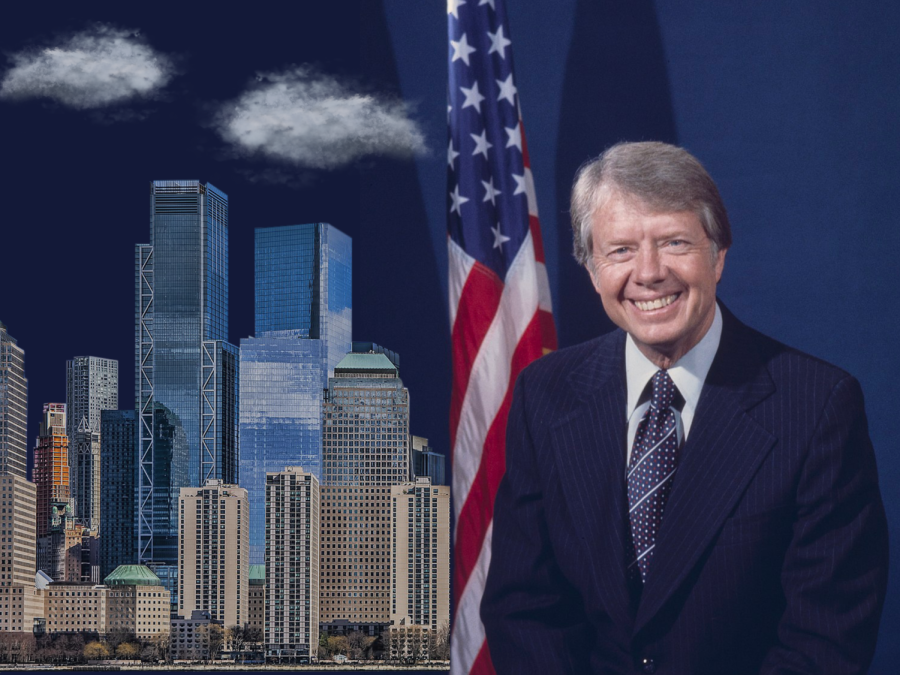Politicians could learn from Carter’s approach to affordable housing
March 13, 2023
The Carter Center announced on Feb. 18 that former President Jimmy Carter, 98, is currently receiving hospice treatment. Since the announcement, thousands have shared their stories of Carter as part of a larger effort to maintain his legacy.
Among Carter’s many achievements, his advocacy for affordable housing should be regarded as a cornerstone of his legacy. His work is even more relevant today as New York City struggles to support the recent influx of migrants.
Nearly 40 years ago, Carter, along with his wife Rosalynn, joined the nonprofit Habitat for Humanity to rebuild a six-story building in East Village. The building, known as Mascot Flats, is still located at 742 E. 6th St.
When the Carters arrived at Mascot Flats, the former tenement building was missing a roof and windows.
“You could stand on the second floor, if you could get up there, and you could look up and see the sky,” Jimmy Carter told AMNY in a 2013 interview. “The garbage was more than knee deep. And there were fires where people were living and cooking up food and dope.”
While the subpar sanitary conditions Carter describes are not as common in New York City today, the city’s limited supply of affordable housing remains an issue.
In a hearing earlier this year, Aldofo Carrión Jr., the city’s housing commissioner, stated that the city should be constructing between 20,000 and 30,000 affordable units per year. However, the overall number of new units built will most likely be 16,000 units.
Today’s elected officials would be wise to channel Carter’s outpouring of support into federal or state legislation to address the housing crisis, such as reforming New York City’s unfair property tax system, which would encourage contractors to build more large rental housing.
The lack of new housing is not the only problem confronting the city.
Indeed, Carter’s decision to receive hospice care coincided with the arrival of thousands of migrants in the city, raising the question of whether they are entitled to the same right to housing that so many American citizens take for granted.
Mayor Eric Adams’ administration is spending nearly $5 million per day on housing and feeding migrants in response to an ongoing surge in asylum seekers coming from the United States’ southern border. In total, about 30,000 migrants are housed in taxpayer-funded structures.
Carter’s involvement with Habitat for Humanity since 1984 shows his belief that housing is a fundamental human right. His support for affordable housing came at a time when most politicians were opposed to the idea, a position that has since changed with bipartisan support.
“[Thirty-five] years ago, affordable housing was very much in need. And I would say now it’s a much greater need,” Carter told Parade in 2018. “And I don’t think that the federal government has given as much attention to affordable housing as it did when it first began. I know it didn’t when I was in the White House as well.”
Lack of affordable housing can impact the way people view themselves in society. A poorly lit or unheated house, for example, can make people feel ashamed of their socioeconomic position and lower their expectations of what they can achieve.
Carter, meanwhile, is a testament of what can be achieved with the right roof over one’s head.
The Carters have resided in the same one-story house in Plains, Georgia, since 1961. Despite his modest living conditions, Carter rose to the position of lieutenant in the Navy and ran his own business before becoming president.
Building homes is not just about providing shelter, but also about improving the community. The construction of a building is an opportunity for entire families to come together and feel a sense of pride in their work.
Carter’s work with Habitat for Humanity has impacted thousands of lives, both those he personally assisted and those he inspired to volunteer. Nonetheless, the strength of his personal investment in this cause speaks to long-standing American ideals of hard work, sacrifice and community.
Carter worked directly alongside 103,000 volunteers in 14 different nations to repair, renovate and build over 4,331 homes, according to Habitat for Humanity.
By spending years constructing houses, Carter has elevated the problem of affordable housing from relative obscurity to the forefront of political debate. It is now up to voters and young Americans to persuade their government to pass legislation and appropriate funds to construct homes for low-income people.
Voters can also make their voices known by electing leaders who favor more affordable housing legislation.
Even though Carter was elected president over four decades ago, the issue of affordable housing has remained central to his life. Carter demonstrated that anyone, including a former president, can work to improve the conditions under which they live.
Long after Carter is gone, Americans should remember him as a good man and a model citizen who, at a time when he could have easily retired into obscurity, brought much-needed attention to an issue that is only now becoming clear.







